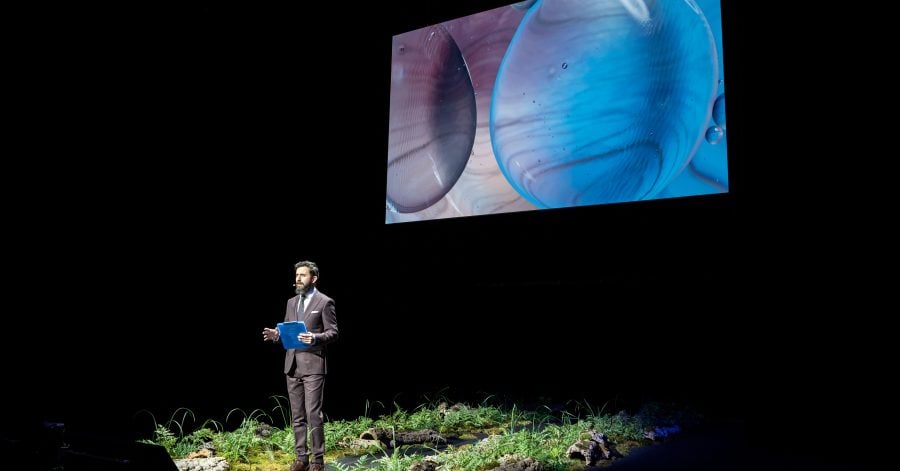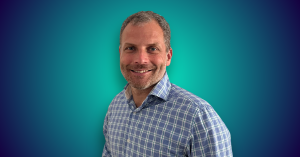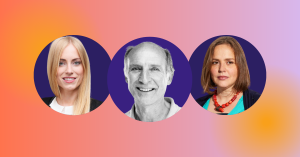Ciprian Stanescu is the President of Social Innovation Solutions (SIS), an organization offering consultancy and support for NGOs and corporations on sustainability, foresight, and innovation. SIS runs a variety of educational programs and business competitions like Future Makers, or conversation platforms like Future Summit. Recently, he explored the future through the lens of deep tech innovation, as he hosted a pitch day at the Hello Tomorrow Global Summit 2021, in Paris.
Ciprian worked 12 years for global organizations like Ashoka and the Aspen Institute and is currently a Board Member of Rethink Romania. He is a Global Shaper Alumni of the World Economic Forum and teachers at The Entrepreneurship Academy in Bucharest. Ciprian holds an MA in Political Science from the Central European University in Budapest.
Below, Ciprian shares his key insights from the Hello Tomorrow Global Summit 2021. Next to it, the Hello Tomorrow Global Challenge is an opportunity for science and deep tech entrepreneurs from all over the world to gain visibility, make connections, and receive equity-free funding of up to €100K.
What I learned about the Future at Hello Tomorrow
I learned that the Future can also be something that we make, not just something that happens to us. There is a global thirst for collaboration in deep tech solutions focusing on sustainable solutions for the future. CEE can and needs to embark on this journey and join the global future makers with our energy, curiosity and imagination.
As entrepreneurs, corporates or investors we grow solutions for the future on a daily basis. Some of us do it for profit and more of us do it with a higher purpose in mind – that of finding alternative solutions not just for the challenges we are currently facing, but also for the challenges of tomorrow. We are, in the end, future makers.
I had the opportunity to host a full day of pitches in Paris, during the Hello Tomorrow Global Summit – one of the most renowned international events and a global early-stage deep tech start-up competition. The HT Global Challenge has attracted more than 24,000 applications in the past 7 years and awarded more than 1 million Euros in prize money. Previous winners have raised more than 1 billion Euros – and counting – since participating in the Challenge.
Sciencepreneurship, impact-investing or tech-for-sustainability are some of the keywords I take back with me home, in CEE. As an organiser of various incubators and accelerators in Central and Eastern Europe I was amazed by the solutions for the future that start-ups from the US to Singapore and from Spain to Japan brought forward.
The Grand Prize of 100.000 euros was won by Atlant 3D Nanosystems from Denmark, a company that facilitates microelectronics manufacturing atom by atom. The 2nd place went to Oxyle from Switzerland, 30K going to a solution that eliminates highly persistent, organic pollutants from industrial and municipal wastewaters. The 3rd prize and 20K euro was won by Lypid, from the US, which is developing vegan fat that can be tuned to precise textures and melting points, mimicking animal fat.
Hello Tomorrow Global Challenge in 2021, in a nutshell, meant more than 4,000 start-ups from 115 countries applying with 70 finalists pitching for 2 days within the HT Global Summit.
Some key principles to take forward in our work at Social Innovation Solutions with CEE start-ups, and not only:
- Start from the problem you aim to fix and think in terms of scale, not in limited geographies.
- Even if you are not a scientist, you can design a science/ deep tech venture with support from others.
- Push yourself and your team to design solutions for the future that incorporate sustainable business making principles.
- Spend at least 3 times more in understanding similar solutions from around the world before starting your own.
- If you have a tech start-up, or not, have some conversations each year with scientists/ academia in your industry.
Someone recently asked me what my favourite start-up at Hello Tomorrow Global Challenge was. I said all 70 – and I was not joking. I will, nevertheless, briefly introduce some that caught my attention and imagination.
All these deep tech start-ups can be seen by many of us as inspiration and aspiration:
Energy & Environment
BEFC (France) is generating electricity using biofuel cells, consisting of paper and enzymes.
NEU Battery Materials (Singapore) is working on a low-cost, sustainable and scalable lithium battery recycling technology.
Food & Agriculture
BIOO (Spain) is developing microbial fuel cells powering agricultural IoT.
Ryp Labs (US) is developing a natural formulation that creates a protective layer around crops, inhibiting premature rotting post-harvest.
Fotenix (UK) is using 3D spectral imaging to create digital twins of a plant to aid plant diagnostics.
CO2 circular economy
Repair (Israel) is capturing CO2 from air using electrochemical CO2 separation technology.
Fairfabrics (France) is transforming captured CO2 into polyester yarns.
Brimston Energy (US) is developing a carbon neutral cement.
Biotech & Industry 2.0
Cellevate (Sweden) is providing nanostructures to enable the growth of cell-based products.
Spintex (UK) is creating the next generation of sustainable fibres for fashion and beyond.
NUprotein (Japan) is developing a cell-free, low-cost protein synthesis technology.
Aerospace
Beyond Aero (France) is developing a light, quiet and sustainable hydrogen-powered private jet.
Vyome (Germany) is providing safe and automated satellite operations using space cameras and AI.
Mobility & Urban Sustainability
Enerdrape (Switzerland) is turning underground infrastructures into renewable heat sources through its modular geothermal panel.
Elonroad (Sweden) is enabling auto-charging of all types of electric vehicles when parked as well as when driving.
SkyEcho (Netherlands) is providing hyperlocal rainfall intelligence, supporting cities adapting to climate risks.
Data & AI
AI Redefined (Canada) is developing a collaborative system between AI and humans to reduce bias and better understand machine decisions
Cubit (Italy) is taking the underutilized CPU, internet bandwidth and storage of users and turning them into web services for companies
Computer & Communication Hardware
C12 Quantum Electronics (France) is developing processors capable of handling large-scale quantum calculations.
Lumiphase (Switzerland) is creating electronic chips to increase the processing capacity of networks while consuming less energy.
Digital Health & Biotech
Deepspin (Germany), is developing a portable, low-cost MRI, enabling point-of-care MRI scans.
PigPug (US) is developing a telemedicine brain training platform for kids with ADHD.
Chain Biotech (UK) is repurposing bacteria to orally deliver antigens.








